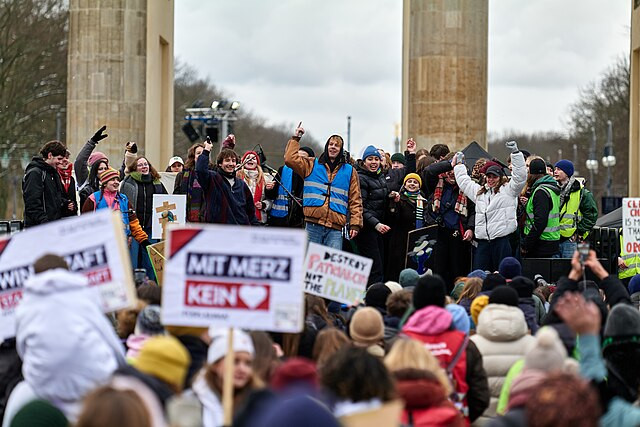Germany heads to the polls Sunday in a pivotal election that will determine the country's next government and influence Europe's response to the Trump administration's foreign policy, including U.S. efforts to end the war in Ukraine. As Europe's largest economy and the second-largest military supporter of Ukraine, Germany's new leadership will play a decisive role in shaping EU policy in an era of shifting transatlantic alliances.
The election follows months of political instability after Chancellor Olaf Scholz's three-party coalition collapsed in November, forcing an early vote. Friedrich Merz, the leader of the center-right Christian Democratic Union (CDU), holds a strong lead in pre-election polls and is favored to become Germany's next chancellor.
Merz has sharply criticized President Donald Trump's approach to Russia, calling it a threat to European security. "We see in America a president who admires autocratic systems and rides roughshod over all kinds of norms," he said in a speech earlier this week, according to the New York Times. His foreign policy stance aligns closely with that of France, with both countries expected to lead efforts to maintain European support for Ukraine.
Other candidates in the race include incumbent Chancellor Olaf Scholz of the center-left Social Democratic Party (SPD), Vice Chancellor Robert Habeck of the Green Party, and Alice Weidel of the far-right Alternative for Germany (AfD).
Weidel's AfD has gained traction, fueled in part by Trump ally Elon Musk's public endorsement of the party in December. The AfD, which opposes military aid to Ukraine and has expressed pro-Russian sympathies, faces challenges in forming a government, as Germany's mainstream parties have ruled out working with them.
The Trump administration's stance on the election has added to tensions between Berlin and Washington. Trump officials have sought to reframe the war in Ukraine, pushing G7 allies to avoid referring to Russia as the aggressor and advocating for direct peace talks with Moscow that exclude Kyiv. The U.S. shift in rhetoric has alarmed German policymakers, who fear it could erode long-standing Western support for Ukraine's military efforts.
Germany has committed €44 billion ($46 billion) in aid to Ukraine since Russia's full-scale invasion in 2022. Merz has pledged to increase military assistance to Kyiv and disagreed with Trump's assertion that Ukraine's NATO membership is unrealistic.
The election will also shape Germany's approach to economic challenges and migration policy, two key issues that have dominated the campaign. Merz has pledged to accelerate economic reforms to address Germany's recent recession, while the AfD has capitalized on growing frustration over migration, making it a central issue in its campaign.
Polls open at 8 a.m. local time on Sunday and close at 6 p.m., with initial results expected shortly after. The final vote count is expected Monday, but forming a new government could take weeks, or even months, as parties negotiate coalition agreements.
A Merz-led government would signal continuity in Germany's support for Ukraine, but his ability to form a stable coalition could determine how assertively Berlin confronts Trump's shifting foreign policy. A strong AfD performance could complicate those efforts, adding uncertainty to Europe's ability to maintain a united front on Ukraine and other global challenges.




